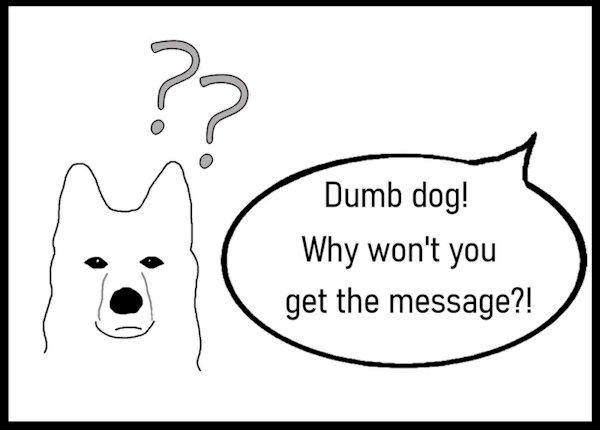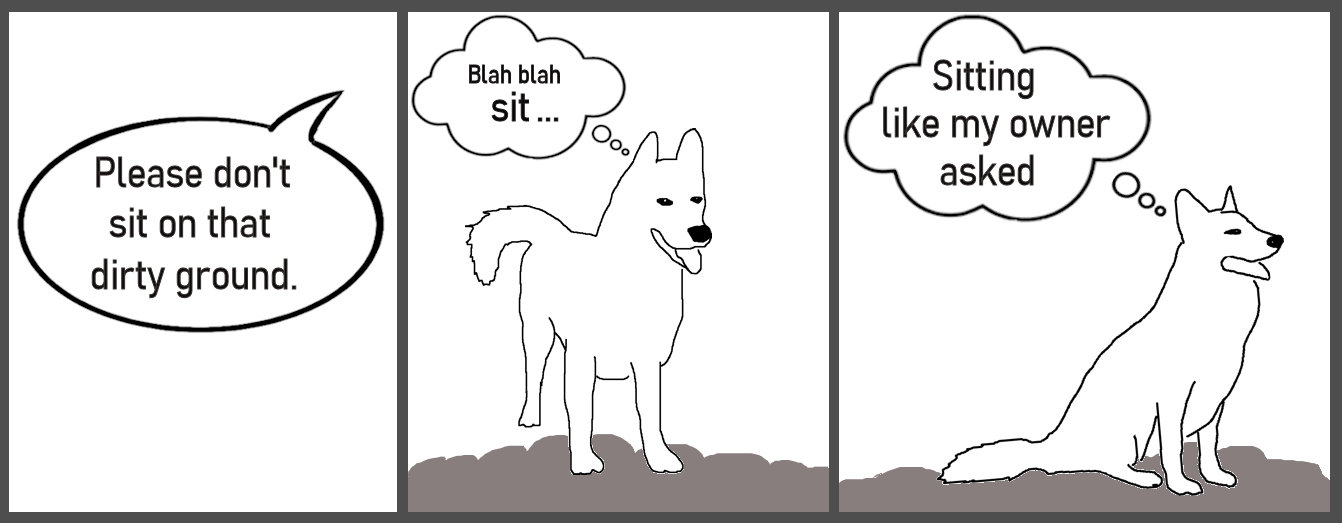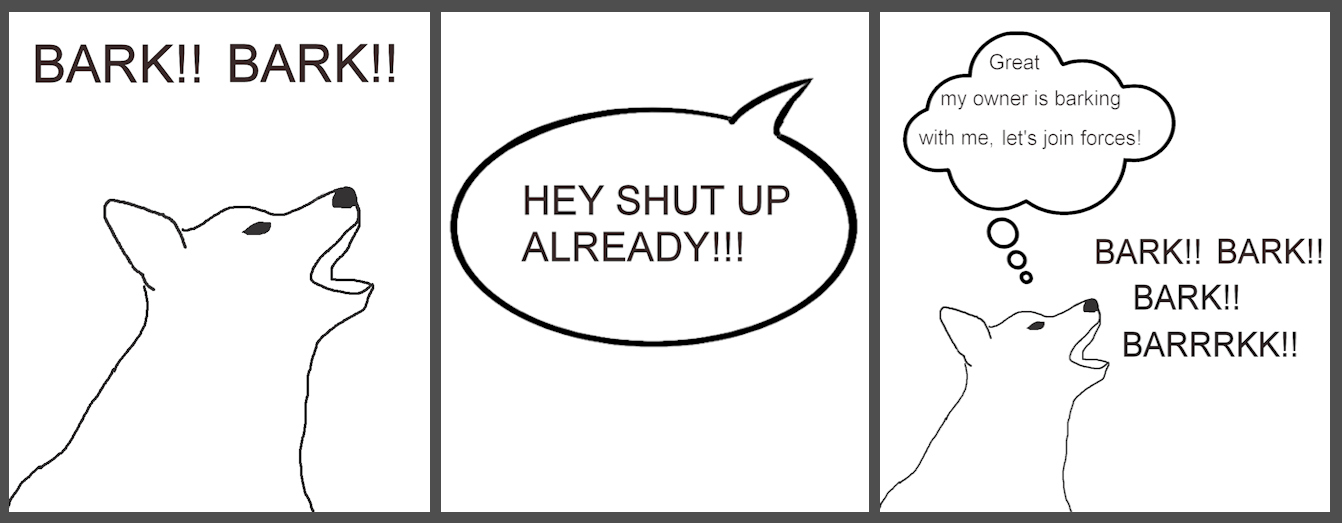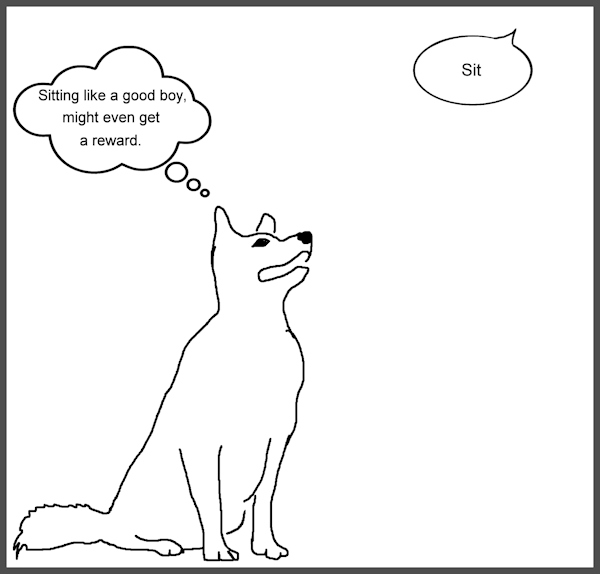There can be multiple reasons for a dog not to obey. In this post I explain the most common reasons behind the disobedience and tips how to overcome them.
An obedient dog is a dog to be proud of, but obedience is also crucial for everyone’s safety. For example a dog can’t stay in the middle of a road to smell trash someone has thrown out of a car window when crossing the road, but needs to move forward if had been told so, so no-one gets hit by an oncoming car.
No dog is disobedient just for the sake of it. There is always a reason behind dog’s (mis)behaviour.

Don’t assume, teach
If you want a dog to master a specific behaviour, for example heeling, the behaviour needs to be taught to him.
Young puppies don’t have a clue how to walk on a leash, so you can’t expect them to know if it hasn’t been taught. (Jerking the leash when a dog is pulling is not educating, it’s a punishment for a wrong behaviour.)
When teaching new things, it’s important to think beforehand what the right behaviour looks like. It’s essential to reward the dog when he’s behaving correctly during training and ignore any wrong behaviours he might attempt.
In addition, if a certain behaviour has been taught to a dog, we can’t assume that he would just know when to behave that way, if we don’t tell him.
Dogs’ ability to understand differ from humans
Dogs are smart beings and they can generalize some things. But when you teach new behaviours, you should pay attention to that a specific behaviour needs to be linked to a specific clue.
We humans in contrast are story tellers. When we tell somebody what we’d like him to do, we say long sentences including multiple details and descriptions of the task that needs to be done.
Dogs however understand best single words or gestures. You shouldn’t swap stories because that’ll only confuse him.
Human energy and trust
We all have bad days, but the fact is that dogs obey best a human who is neutral and in a good mood.
If a dog’s owner is in a bad mod, angry, ill, tired or stressed, the dog might even decide not to obey because he thinks that the owner isn’t capable of making good decisions at that moment.
We also need to pay close attention to our own body language. Most dogs don’t like people getting too close or to lean over them. I bet you wouldn’t like either if a total stranger hugged you for no reason and wouldn’t let go.
Dogs are masters at reading human emotions and they know whether you trust yourself and your dog or not. You can’t fool a dog on this one. If you’re even secretly scared of your dog failing at something, he probably will.
Practise is the key if you feel unsure. You should practise with your dog on a calm neutral set-up like in your house. When your dog masters the new behaviour like heeling or passing food on the ground you most likely feel more confident and trust your dog more when you encounter these situations outside your house.
When your dog senses the trust he is most likely to succeed.
Pay attention to what you say
You should always use the same cues you have taught to your dog.
Let’s assume, that a dog has been taught these behaviours with the same cue as the behaviour is:
let’s go, wait, stop, come, sit
But when the owner takes the dog on a walk he uses phrases:
hey let’s go now, hey wait now, hey stop now, hey come now, hey sit now
Every cue starts with hey and ends with now, so all the cues sound more or less the same. The dog is certainly confused or in the worst case he might’ve learned for example that “hey” means “(hey) let’s go” and when his owner says “hey stop” he only hears the first “hey” and assumes it means “(hey) let’s go” although the owner wants the dog to stop.
The dog isn’t disobedient on purpose, but he has learned a different meaning for the cue than his owner intended.
In addition we can’t assume that dogs automatically know what it means it we add no or don’t with the original cue.
If this dog’s owner want his dog to stand, he should teach him to “stand” instead of “don’t sit”.

Dogs don’t understand synonyms either like people do so always use the correct words.
Pay attention to how you say
Intonation is important when repeating cues. Your dog might have learned the intonation of the word as the cue, not the word itself.
You can test this if you want. Ask someone else to say the word you have taught and your dog might be absolutely clueless what to do. Although the word is the same but the right intonation is missing. Vice versa, you can test using a wrong word with the intonation of the right word and your dog might still know what you’re asking.
Friendly tone is also important. Which boss would you rather obey, a boss that yells at you although he didn’t give you proper instructions on how to do something or a boss that praises you for your creativity when he didn’t have the time to tell you how the thing should’ve been done?
If you want a dog to obey don’t yell at him. No matter how frustrating the situation is, yelling will only escalate things. Your dog might even think you’re starting to bark with him and puts more fuel to the fire.
No matter how frustrating the situation is, stay as calm as you possibly can.

Mixed cues and signals
One reason for the seeming disobedience might be that a verbal cue and body language are in discrepancy.
Let’s say a dog owner is teaching his dog a recall and he uses a word come. The owner hasn’t paid attention that his left hand has been in his pocket during the training. Dogs are masters at reading gestures so the dog might learn that the cue to the recall is: left hand in the pocket.
The owner thinks he has taught the recall with a verbal cue: come, but the dog has learned that the cue is left hand in the pocket. Then when the owner calls his dog using the word come, his dog doesn’t come to him because his left hand isn’t in his pocket.
Unintentional smell signals
Dogs have an amazing ability to smell compared to people. This subject might be hard to tackle, because dogs live their life through their noses, like we humans live our lives through our eyes. Unfortunately we are not able to smell the things our dogs smell.
If an unusual odour has been floating in the air when you have taught some behaviour to your dog, your dog might have linked this odour as the cue to the behaviour. And later on when the odour is missing the dog seems to be clueless when you ask him to repeat the behaviour.
But as I said this topic is hard to tackle, so you’ll just have to be aware of it and accept it.
What you want the dog to do?
Dogs are fast. By that I don’t mean they can run fast, but instead that they are quick at changing between actions and behaviours. So you need to pay close attention what you ask for your dog do, so that you ask the right behaviour at a right time. Also that you reward (mark) the correct behaviour just at the right time.
If you ask your dog to sit, you are too late to reward him if he has just swiped his butt on the floor quickly and are back up standing again. If you reward your dog at this point, you’ll only reinforce him that the cue sit means: swipe your butt on the floor and then you can do what ever you want.
The correct way to sit would be to sit as long as he’s been freed or asked to do something else.

Rewarding
There are two important things you need to pay attention when rewarding a dog: the right timing and the quality of the reward.
When you teach new behaviours to your dog, he should be rewarded every time he does what he is supposed to do. Later on when he already masters the behaviour you can reward him only every now and then. You can praise him every time he succeeds, so you tell him he did the right thing, but you don’t have to pull a treat or a toy from your pocket every time.
Humans can’t define or decide what things dogs seems as rewards. If you want to reward a dog you need to find out the things he values.
Different dogs value different things. One likes attention or belly scratches, second one likes food or treats, third one may like toys or just a particular toy like his favourite ball and so on. For example Miki doesn’t value toys at all but he loves food and treats, so I only reward him with food. If I would try to reward him with toys, he wouldn’t obey for long because why bother?
You wouldn’t stay in a job for a long if your boss was an enthusiastic stamp collector and he’d pay your whole salary in postage stamps - would you?
Another key thing is the right timing. Dogs link the rewards to the behaviour only if they are rewarded within one second of the behaviour. Any later, they think they are been rewarded for the thing they are doing at that moment.
None of us humans is that fast to take a treat from a pocket. So instead we need to mark the correct behaviour within the one second time limit and after marking it, we have time to take the reward from the pocket.
You can mark the correct behaviour with words or a clicker - but the meaning of the praise or the clicker needs to be taught beforehand.
Rewarding wrong behaviour
The more you reward a dog for a wrong behaviour the more likely he will repeat it.
Let’s think of a young puppy who’s jumping on people when greeting them and gets lots of attention and petting as reward. The puppy learns quickly that the jumping pays well so he’s likely to repeat the behaviour every time he meets people.
The only way to teach him not to jump is to ask friends meet the puppy and give them instructions beforehand to ignore the jumping and pet him only when all four paws stays on the ground.
Many people finds the jumping puppy cute, but it needs to be kept in mind that the puppy will grow up. If an adult dog jumps against small children or elderly people it can lead to serious injuries.
You should only reward a behaviour that you’ve asked for, not a behaviour where your dog is cutting corners.
Punishments
Imagine a situation, that your boss asks you to do something. You are not sure how it needs to be done and there’s no one available to help you. You do it to the best of your knowledge because the task is urgent. The next day your boss yells at you because you did it wrong and threatens to fire you if you don’t pull your act together. How would you feel about that? I bet not very nice because you did the best you could in that situation.
Dogs feel punishment similarly as a negative thing. The more a dog is been punished the more passive he will get and he’s more and more afraid to try anything because of the fear of a punishment. This type of dog is very passive and “disobedient”. If he has been punished repeatedly, he might feel that the punishment comes no matter what.

Fear
Try to look at things from a dog’s perspective. A dog might not obey if you ask him to do something he’s afraid of.
Like if a dog has been taught to jump but he’s just too afraid to jump from a pier into a rocking boat. Or a dog that loves to perform tricks at home but when he is with his family visiting friends the dog freezes and does nothing he’s asked to do. The dog might fear something on the friends house like a shiny or slippery floor if he has got used to carpet at home. Or he might be afraid of a specific person there, or even your friends dog on whose territory he’s at.
One example is a dog that is lunging and barking on a leash and he’s not calming down although he’d been asked. He might be so intimidated by the on comers that he thinks he’s been forced to act that way. If this sounds familiar, you should read the blog posts: Are reactive dogs just highly sensitive? and Passing other dogs.
Follow through
A dog’s obedience is also affected by his owners will to follow through when he ask the dog to do something. If the owner always gives up and let the dog to have a choice not to obey, the dog is not likely to obey if he still gets to have or do what he wants. He’ll learn very quickly not to obey, why would he obey if he still gets what he wants?
For example a dog is on a walk with his owner and the dog stops walking and starts to smell interesting pee mail. The owner would like to continue walking and says the cue let’s go. In spite of that the dog continues to smell and and the owner just waits and waits and waits… The dog has no motivation to obey because he’s owner never follows through and lets his dog to do whatever he likes and in addition this dog is been rewarded by smelling the pee mail.
The more the person gives in the less the dog obeys. If the dog’s owner never follows through, then why would he even bother to ask his dog to do something? Just to see if the dog hasn’t got anything better do to?
When the dog finally moves forward, he shouldn’t be praised or rewarded any more, because then he will only learn that he can do what ever he wants when ever he wants and still get the reward. That would practically be rewarding him for the disobedience.
The only way to turn the tide is to follow through. Keeping in the mind that a dog can’t be forced to do things, but instead he needs to get a mindset that obedience is fun because it pays well. As soon as a dog learns this he don’t even need to be forced. And also when the dog (randomly) obeys the cues right away it needs to be reinforced with a reward.
Now the dog learns that obedience pays well and disobedience doesn’t.
A reliable recall
A reliable recall can someday save your dog’s life.
Example: a dog is with his owner in a dog park and the dog is loose. The owner calls his dog to come and the dog doesn’t come but instead keeps playing with other dogs. Why won’t the dog come when called?
- has the recall been taught to the dog properly or does his owner just assume the dog knows it?
- did he say the right cue and intonation as it has been taught, taking into account the owners body language?
- is the recall taught to he dog so the dog thinks he needs to act right away?
- does the dog assume that he will get a reward when he comes?
- does the dog fear he might get punished for something?
- does the dog fear that the fun playtime ends and he is been taking back to home although he wants to keep playing?
The recall needs to be taught to the dog the way it makes the dog feel like when he comes it will lead to something positive, like a reward. In the beginning when you teach the recall to your dog he needs to be rewarded with the things he values the most. This way the dog learns to come quickly because he might get awesome rewards for it.
In the dog park example a reward could be a free cue, so when the dog comes when called he can then go and continue playing. This way the dog learns that the fun games don’t end on the recall: I’ll have time to go and say hello to my owner because he will let me get back to playing in no time.
Here you can see Miki forgot to brake in time when I called him so he collided with me. He was in a hurry.

If you’re about to do something to your dog he doesn’t like, like clip his nails, never call him to you. This would only teach him not to come if he sees the nail clipping as a punishment. He might even start to get afraid of the recall.
Focus on your dog and he will focus on you
This is so true. Before I knew this I focused on the passing dogs when I walked Miki and Miki did the same. Those situations did not have a great outcome. Nowadays when we pass other dogs on our walks I focus on Miki and Miki focuses on me and we pass other dogs with flying colours.
I have a funny story about focusing. When Miki was a teenager we attended on a basic obedience class. Before the first class the instructor send me a guide to read beforehand. The guide said: Focus on your dog. That’s what I decided to do.
The class had 6 or 7 other dogs with their owners. The course consisted of 6 training sessions. The first 5 sessions I listened the instructor but I was so focused on Miki that I didn’t pay attention to anything that happened around us.
When the training was almost complete, in the last class we had to form pairs with the other dogs and their owners to do a certain exercise. At this point I noticed that a colleague from the same office had attended the same class the whole time, but I had been so focused on Miki I hadn’t even notice this acquaintance. That if anything was proper focusing on my dog!
Lastly,
if you feel that you have tried everything and your dog still doesn’t obey, you should visit your vet to rule out any possible illnesses.
At the same time keeping in mind that dogs are dogs and even we humans don’t blindly obey each other.
21.5.2020